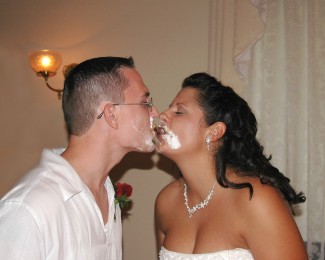When to hyphenate adjectives or word combinations that act as adjectives has long caused writers confusion. As usual with grammar rules, once you hear the answer and understand the principle, hyphenating compounds turns out to be pretty easy.
Hyphens Make Word Marriages
A compound is a word marriage. It’s the name grammarians give to two or more words stuck together by a hyphen. Examples are risk-taking daredevil, happy-go-lucky girl, and rain-streaked window.
 Why do those hyphens belong there? Because in each case, two or more words are joining up to form a single idea modifying a noun. It isn’t a risk daredevil and a taking daredevil, but a risk-taking daredevil—risk and taking come together to form a single idea. It isn’t a rain window and a streaked window, but a rain-streaked window. Here rain and streaked act as one word to modify window, so we make them into a compound word.
Why do those hyphens belong there? Because in each case, two or more words are joining up to form a single idea modifying a noun. It isn’t a risk daredevil and a taking daredevil, but a risk-taking daredevil—risk and taking come together to form a single idea. It isn’t a rain window and a streaked window, but a rain-streaked window. Here rain and streaked act as one word to modify window, so we make them into a compound word.
It’s a different story with an expression like hot, muggy day. You can say hot day or muggy day and have them both make sense, so hot and muggy don’t need a hyphen—they don’t need to become a compound word. Those adjectives both can stand alone in modifying day.
Hyphens Prevent Confusion
Leaving out a required hyphen is one of the most common punctuation errors I come across as a book editor. Perhaps hyphens get left out because they seem superfluous to people, but often, without them, the meaning of a sentence is actually changed.
 What do you make of this ambiguous expression, for instance: man eating lion? Is the man eating the lion? Or is it a man-eating lion? How about this one: little used car . . . is it a used car that is little, or is it a little-used car? Then there’s the white cab driver . . . is a white person driving a cab, or is a white cab being driven? If a white cab’s being driven, you would write white-cab driver. Without the hyphen, it means a white person driving a cab.
What do you make of this ambiguous expression, for instance: man eating lion? Is the man eating the lion? Or is it a man-eating lion? How about this one: little used car . . . is it a used car that is little, or is it a little-used car? Then there’s the white cab driver . . . is a white person driving a cab, or is a white cab being driven? If a white cab’s being driven, you would write white-cab driver. Without the hyphen, it means a white person driving a cab.
When You Can Leave Them Out
You can see now why the hyphen is more important than it looks to be at first glance. I should mention that sometimes—only rarely—the hyphen can be left out. This happens when the two words modifying the noun as a unit are typically used together in common speech.
Examples would be real estate ad, ice cream sundae, and high school senior. We’re used to seeing the two words real estate appearing together all the time, so we don’t need a hyphen between them when  they’re used to modify ad. We’re also used to seeing ice and cream together to mean ice cream, so we don’t a hyphen in ice cream sundae. In the same way, high and school appear together all the time to mean high school, so we don’t need to join them with a hyphen when they modify senior.
they’re used to modify ad. We’re also used to seeing ice and cream together to mean ice cream, so we don’t a hyphen in ice cream sundae. In the same way, high and school appear together all the time to mean high school, so we don’t need to join them with a hyphen when they modify senior.
Now you know all about when to hyphenate adjectives and nouns in compound expressions. What about hyphenating an adverb and adjective getting cozy with each other, as in easily understood problem or swiftly run race? For that answer, visit my companion article, When to Hyphenate Adverbs.
Jessi Rita Hoffman … book editing by an industry professional
